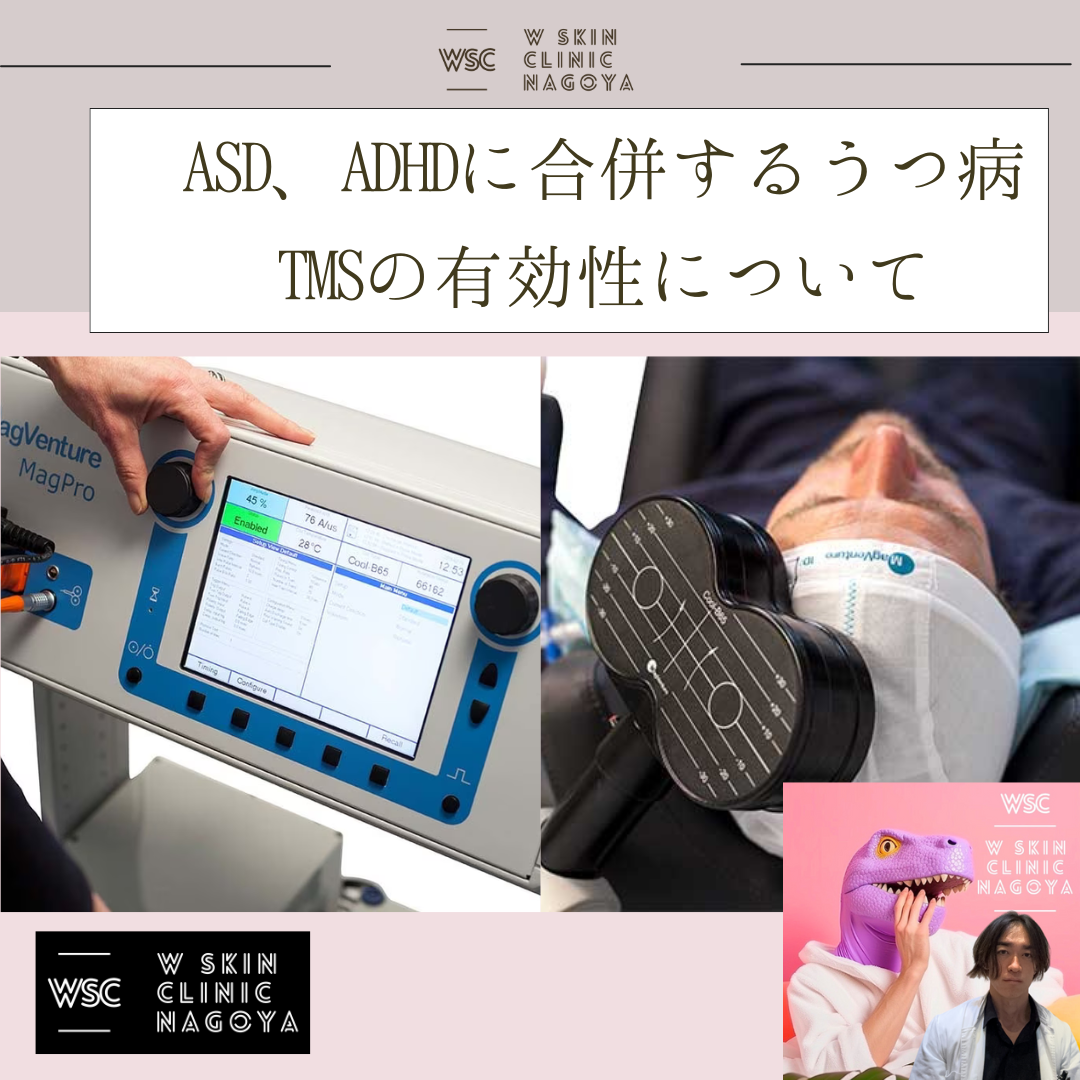NEWSお知らせ
2024.10.06|ブログ
ASD、ADHDに合併するうつ病にTMS治療は有効か?またASD、ADHD症状の改善の可能性はあるか?名古屋の美容皮膚科医が解説

ASD、ADHDに合併するうつ病にTMS治療は有効か?またASD、ADHD症状の改善の可能性はあるか?名古屋の美容皮膚科医が解説
こんにちは、Wスキンクリニック名古屋、院長の加藤晃司です。
今回は、ASD、ADHDに合併するうつ病にTMS治療は有効か?またASD、ADHD症状の改善の可能性はあるか?について解説します。
- TMS治療とは?
TMS(経頭蓋磁気刺激療法、Transcranial Magnetic Stimulation)は、非侵襲的な脳刺激治療で、うつ病などの精神疾患に対して有効性が認められています。TMSは、磁気パルスを用いて脳の特定部位を刺激し、神経細胞の活動を調整する治療法です。特に、治療抵抗性のうつ病患者に対して効果的であることが知られています。
- ASD(自閉スペクトラム症)とADHD(注意欠陥・多動性障害)に合併するうつ病に対するTMS治療の有効性
ASDやADHDは、うつ病を合併することが多いです。これらの発達障害を抱える人々は、対人関係の困難さや自己調整機能の低下、日常生活のストレスなどが原因で、うつ病のリスクが高まります。通常の抗うつ薬や心理療法が効果を示さないことが多く、TMSが有効な代替治療として期待されています。
2.1 TMS治療のメカニズム
TMSは、うつ病治療において前頭前野をターゲットにします。前頭前野は感情調整や認知機能を司り、TMSがこの部位の神経活動を調整することで、うつ症状の改善が期待されます。ASDやADHDに合併するうつ病では、薬物療法の副作用や効果のなさに対して、TMSは副作用が少なく非侵襲的であるため、治療オプションとして魅力的です。
2.2 ASDおよびADHDのうつ病に対するTMSの有効性に関するエビデンス
複数の研究が、ASDやADHD患者に対してTMS治療が有効であることを示しています。特に、ASD患者においてはTMSが感情調整や社会的スキルの向上に寄与する可能性があり、ADHD患者に対しては注意力や実行機能の改善が報告されています。
- ASDやADHD症状そのものへのTMS治療の可能性
ASDやADHDの症状に対しても、TMS治療が一定の効果をもたらす可能性があるとする研究があります。これまでの研究結果から、TMSが以下のような症状に対して改善効果を示すことが期待されています。
3.1 ASDに対するTMSの効果
社会的スキルの改善: ASD患者において、TMSはコミュニケーションや感情の読み取りに対する脳の活動を改善し、社会的スキルの向上に寄与する可能性があります。前頭前野への刺激が、感情や行動の調整を助けることが示唆されています。
感覚処理の改善: 一部のASD患者において、感覚過敏や感覚処理の困難さが軽減することが報告されています。
3.2 ADHDに対するTMSの効果
注意力と集中力の向上: ADHDの症状には、注意力の欠如や集中力の低下が含まれますが、TMSは前頭前野を刺激することで、これらの機能を改善することが期待されています。
衝動性の軽減: TMS治療によって、ADHDに特徴的な衝動的な行動が抑えられることも報告されています。
- TMS治療のメリットと限界
メリット:
非侵襲的で安全性が高い: TMSは手術を必要とせず、副作用も少ないため、薬物療法が合わない患者にとって安全で効果的な治療法です。
日常生活への影響が少ない: TMSは外来で行える治療で、通常の生活に支障をきたすことなく治療を続けられます。
限界:
効果に個人差がある: TMSの効果は患者によって異なるため、すべての患者に効果が見られるわけではありません。
複数回の治療が必要: 通常、TMS治療は1回だけで効果が現れるわけではなく、数週間から数か月にわたって複数回行う必要があります。
- まとめ
ASDやADHDに合併するうつ病に対して、TMS治療は有効な治療法として期待されています。うつ症状だけでなく、ASDやADHDの特有の症状に対しても、TMSが改善効果をもたらす可能性があります。薬物療法の副作用に悩む患者や、他の治療法で効果が得られない患者にとって、TMSは重要な治療オプションとなるでしょう。
当法人ではTMS治療が日本に導入されてからすぐに臨床に応用し、これまで多くの患者さんに利用してきていただきました。
データも蓄積しており、論文も作成しています。
現在モニター募集も行っておりますので、ご興味のある方はクリニックまでお問合せください。
Wスキンクリニック名古屋での、TMS治療はこちら
https://www.w-clinic-nagoya.com/tms
現在TMS治療のモニター募集しております。
ご興味のある方は、クリニックまでお問い合わせください。
Wスキンクリニック名古屋
理事長 加藤晃司
当院では無料でスタッフカウンセリングを行なっております。
お気軽にご予約くださいませ
Wスキンクリニック名古屋 (美容皮膚科)
https://www.w-clinic-nagoya.com/
〒461-0005 愛知県名古屋市東区東桜 2-4-1 第3コジマビル6F
TEL 052-7377-7117(10:00~19:00)
LINE ID @w.nagoya
高岳駅より徒歩4分 / 新栄町駅より徒歩5分
お車でお越しの方
名鉄協商パーキングチケットをお渡しいたしますので、クリニック近くのパーキングをご利用ください。
ご予約、お問合せ、Wスキンクリニック名古屋公式LINEからも可能です。
LINE ID : @w.nagoya
友達追加は↓から
Wスキンクリニック名古屋公式インスタ↓
https://www.instagram.com/w.skinclinic.nagoya?igsh=NHhoODFnaXB2b2ll&utm_source=qr
Wスキンクリニック院長 加藤晃司インスタ↓
https://www.instagram.com/w.skin.nagoya.kojikato?igsh=aW9nbWZwNjNjZ3pz&utm_source=qr
Is TMS Therapy Effective for Depression Associated with ASD and ADHD? Can It Improve ASD and ADHD Symptoms? Explained by a Nagoya Dermatologist
Hello, I’m Dr. Koji Kato, Director of W Skin Clinic Nagoya.
Today, I will explain whether TMS (Transcranial Magnetic Stimulation) therapy is effective for depression associated with ASD (Autism Spectrum Disorder) and ADHD (Attention Deficit Hyperactivity Disorder), and whether it may improve ASD and ADHD symptoms.
- What is TMS Therapy?
TMS (Transcranial Magnetic Stimulation) is a non-invasive brain stimulation treatment that has been recognized for its effectiveness in treating depression and other mental health conditions. It uses magnetic pulses to stimulate specific areas of the brain, adjusting neuronal activity. TMS is especially known to be effective for treatment-resistant depression.
- Effectiveness of TMS Therapy for Depression Associated with ASD and ADHD
People with ASD and ADHD often experience comorbid depression due to challenges with social interactions, emotional regulation, and the stresses of daily life. Traditional treatments like antidepressants or psychotherapy may not always be effective, making TMS a promising alternative.
2.1 Mechanism of TMS Therapy
In depression treatment, TMS targets the prefrontal cortex, which regulates mood and cognitive functions. By stimulating this area, TMS can alleviate depressive symptoms. In cases of depression associated with ASD or ADHD, TMS is an appealing treatment option due to its non-invasive nature and minimal side effects compared to medications.
2.2 Evidence of Effectiveness for ASD and ADHD-Related Depression
Research suggests that TMS therapy can be effective for patients with ASD and ADHD. Specifically, TMS has been shown to improve emotional regulation and social skills in ASD patients. For ADHD, improvements in attention and executive function have been reported.
- Possibility of TMS Therapy Improving Core ASD and ADHD Symptoms
Recent studies have also explored the potential for TMS therapy to improve core symptoms of ASD and ADHD. These studies suggest the following possible benefits:
3.1 TMS for ASD Symptoms
Improvement in Social Skills: TMS can enhance brain activity related to communication and emotional processing, potentially helping ASD patients improve their ability to interpret emotions and interact socially.
Sensory Processing Improvement: In some cases, TMS has been reported to reduce sensory hypersensitivity or difficulties in sensory processing often experienced by ASD patients.
3.2 TMS for ADHD Symptoms
Improved Attention and Focus: ADHD patients often struggle with attention deficits. TMS may improve focus and attention by stimulating the prefrontal cortex.
Reduced Impulsivity: TMS may also reduce impulsive behaviors, a common characteristic of ADHD.
- Benefits and Limitations of TMS Therapy
Benefits:
Non-invasive and Safe: TMS does not involve surgery and has minimal side effects, making it a safe and attractive option, especially for patients who cannot tolerate medications.
Minimal Disruption to Daily Life: TMS is an outpatient procedure, meaning patients can continue their normal activities while undergoing treatment.
Limitations:
Variable Effectiveness: The response to TMS can vary among individuals, and it may not be effective for everyone.
Multiple Sessions Required: TMS typically requires multiple treatments over weeks or months for optimal results.
- Conclusion
TMS therapy offers a promising treatment for depression associated with ASD and ADHD. It may also have the potential to improve specific symptoms of ASD and ADHD, such as emotional regulation and attention deficits. For patients who experience side effects from medications or find traditional treatments ineffective, TMS is an important alternative therapy.
At our clinic, we have applied TMS therapy clinically since its introduction to Japan, and we have treated many patients with success. We have accumulated significant data and are currently working on publishing academic papers on this subject.
We are also recruiting participants for TMS monitor programs, so if you are interested, please feel free to contact our clinic.




